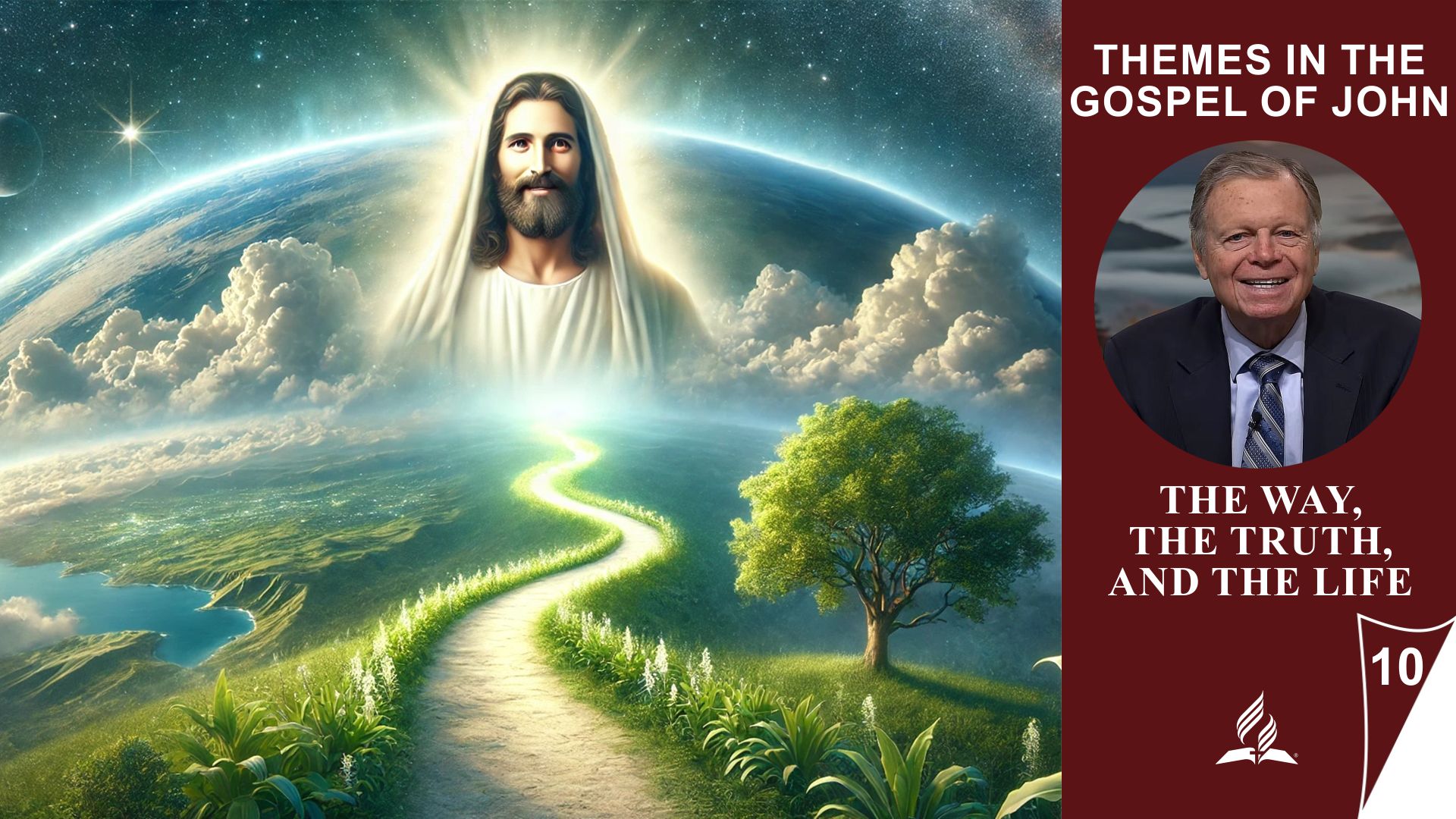
Themes in the Gospel of John – Lesson 7.Blessed Are Those Who Believe | Sabbath School with Pastor Mark Finley
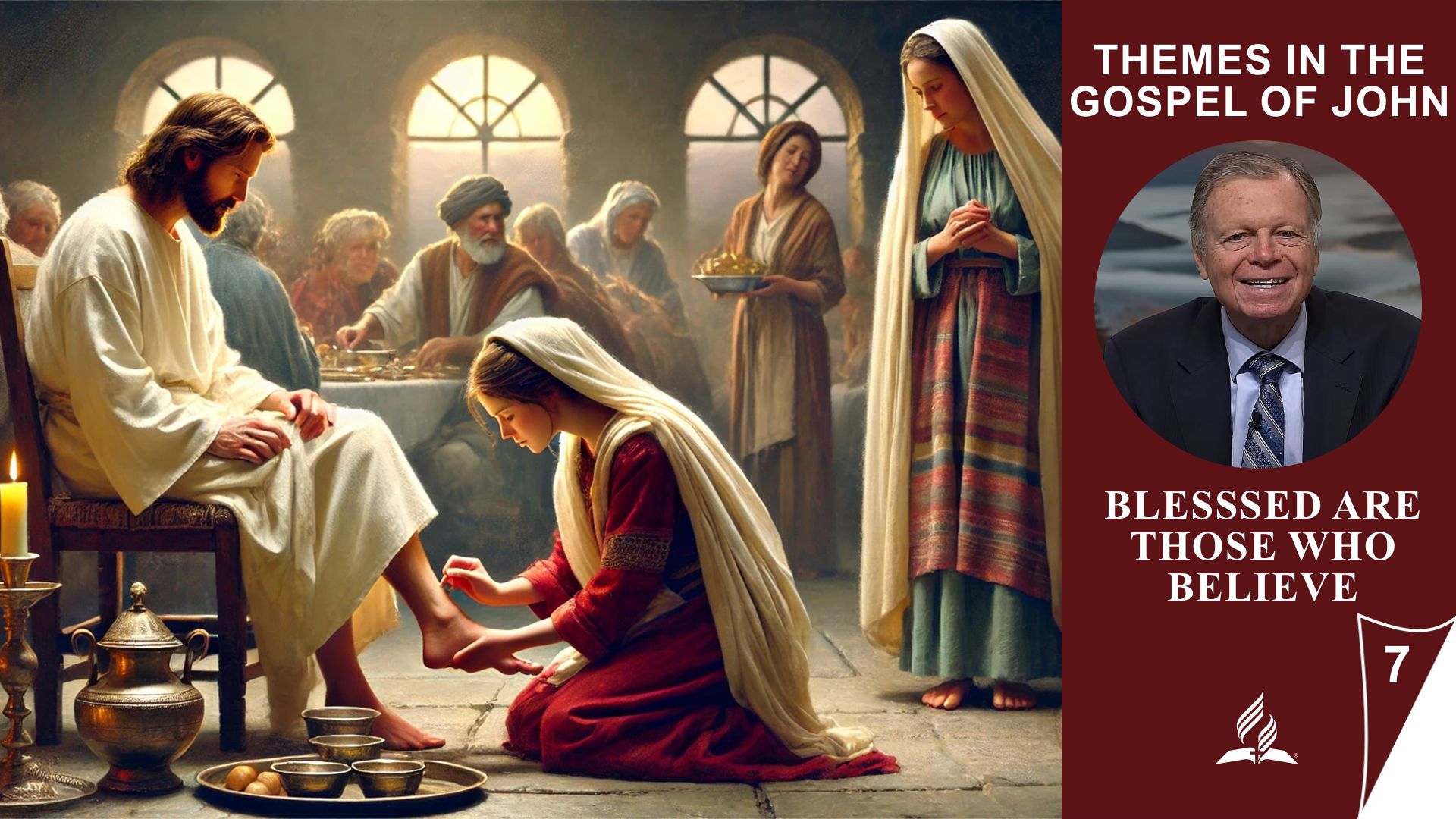
Series JESUS IN THE GOSPEL OF JOHN with Pastor Mark Finley |
Lesson 7.Blessed Are Those Who Believe |
Witnesses of Faith in the Gospel of John |
Lesson 7 of the Gospel of John invites us to view faith through the eyes of various witnesses of Jesus and to recognize the significance of faith without visible evidence. From Abraham to Thomas, it is shown how people in different situations responded to Jesus—with trust, doubt, or unconscious acknowledgment. These witnesses illustrate that faith often requires courage and enables a deeper insight into God’s workings. Jesus emphasizes the blessedness of faith that is not based on visible signs but on trust. By living this faith, we gain access to a vibrant relationship with God that gives us hope and life.
Memory Text: John 20:29 – “Jesus said to him, ‘Thomas, because you have seen Me, you have believed. Blessed are those who have not seen and yet have believed’.”
Content:
7.1 Harking Back to Abraham
Abraham as a Witness of Faith and Promise
Jesus refers to Abraham to emphasize the continuity between the faith of the patriarchs and His own message. In John 8:56, Jesus shows that Abraham “saw his day” from afar and rejoiced over it—a reference to the Redeemer that Abraham experienced as part of God’s promise. Paul picks up this thought in Romans 4 by presenting Abraham as an example of justification by faith, independent of the works of the law. This emphasis on faith as the foundation of the relationship with God makes Abraham the father not only of the Jewish people but of all believers. Through Abraham’s story, the importance of faith that trusts in God’s promise is highlighted—a connection that Jesus reveals as the fulfillment of this promise.
7.2 The Witness of Mary
Mary’s Precious Gift as an Expression of Faith
Mary’s act of anointing Jesus with expensive oil was a profound testimony of her love and gratitude toward Him. The costly oil she used lavishly symbolized her complete devotion and recognition of Jesus as the one who brings forgiveness and new life. Her gesture was not only a sign of honor but also a prophetic act pointing to Jesus’ impending sacrifice. While Judas showed selfish motives in his criticism, Jesus defended Mary because He recognized the sincerity of her love and the faith in her heart. This story reminds us that Jesus looks beyond the exterior and knows the hearts—a call for us to let His transformative righteousness enter our lives.
7.3 The Unwitting Witness of Pilate
Pilate’s Unconscious Testimony of Truth
Pilate, the Roman governor, played a central role in the trial against Jesus and gave an involuntary testimony about Him. Although he declared Jesus innocent three times, he ultimately condemned Him to death—a decision influenced by the pressure from religious leaders and the crowd. By placing the sign “Jesus of Nazareth, the King of the Jews” above the cross, Pilate unwittingly affirmed Jesus’ true identity as portrayed in the Gospel of John. The drama surrounding Pilate’s decision highlights the danger of being swayed by external influences instead of following one’s conscience. This event reminds us of the importance of steadfastly standing by the truth, even when circumstances create pressure and doubt. Pilate’s wavering serves as a warning against the temptation to betray the convictions of the heart to please the masses.
7.4 The Witness of Thomas
From Doubt to Confession of Faith – Thomas’ Lesson
Thomas’ story shows how doubt can be transformed into a stronger conviction of faith. Thomas made the mistake of tying his faith to physical evidence and only acknowledged the resurrection under his own conditions. However, Jesus met him with understanding and invited him to touch the wounds in His hands and side, leading Thomas to a powerful confession: “My Lord and my God!” (John 20:28). Jesus’ words, “Blessed are those who have not seen and yet have believed,” remind us that true faith is not based on visible evidence but on trust in God’s testimony and His creation. This encounter teaches us that doubt can often be part of the journey of faith, but the goal is to reach a trust that exists even without “seeing.” The faith that Thomas ultimately found is an open trust in the reliability of God and His promises.
7.5 Our Witness of Jesus
Our Testimony – Faith Strengthened by History and Experience
The Gospel of John calls us to give our own testimony about Jesus, inspired by the testimonies of those who experienced Him directly. We have the advantage of not only reading about Jesus’ life and miracles but also recognizing the fulfillment of many of His prophecies in history, such as the destruction of the temple and the worldwide spread of the Gospel. These historical confirmations provide us with reasons for faith that go beyond mere eyewitness accounts. Today, we are called to accept Jesus as the Savior through Scripture and the power of the Holy Spirit and to share this experience. Each of us has a unique story and a personal experience with Christ, and by sharing them, we continue what the first witnesses of Jesus began—a testimony of faith that also works life-changing in our world.
7.6 Summary
Faith Without Seeing – The Path to True Blessing
In Lesson 7, the Gospel of John emphasizes the importance of faith that is not based on visible evidence but on trust in God’s word. Through the testimonies of Abraham, Mary, Pilate, and Thomas, John illustrates various responses to Jesus and highlights the strength of faith that goes beyond the visible. Abraham trusted the promise, Mary showed deep gratitude, Pilate gave an unintended testimony, and Thomas learned to believe without seeing. Jesus Himself praises the blessedness of those who believe without proof and invites us to trust in God’s plan and word. This lesson reminds us that true faith is the foundation for a deeper relationship with God—a relationship that grants us life in His name.
Themes in the Gospel of John – Lesson 6.More Testimonies About Jesus | Sabbath School with Pastor Mark Finley
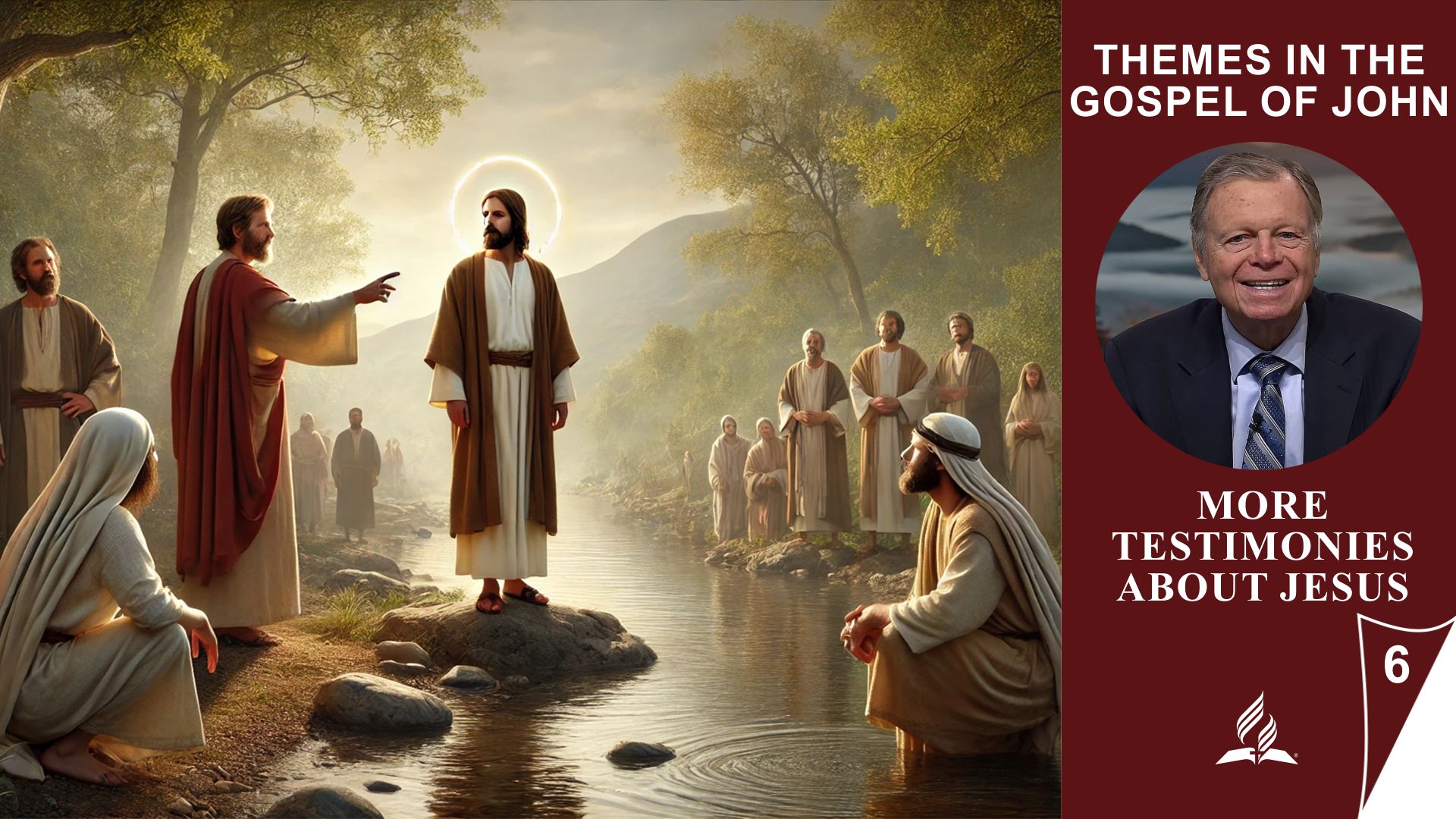
Series JESUS IN THE GOSPEL OF JOHN with Pastor Mark Finley |
Lesson 6.More Testimonies About Jesus |
Recognizing More About Jesus |
In Lesson 6, the image of Jesus as the Messiah is deepened through various testimonies. John the Baptist, the Father in Heaven, the crowd, and even the Pharisees themselves play an important role in clarifying Jesus’ identity and mission. John presents Jesus as the sacrificial lamb who takes away the sin of the world and emphasizes that Jesus must be above him. Jesus reveals Himself as the source of life and salvation, even though His words are not understood or accepted by everyone. The Father confirms Jesus’ sonship, and the reactions of the crowd show both enthusiasm and rejection, giving us a more comprehensive insight into Jesus’ mission.
Memory Text: John 12:32 – “‘And I, if I am lifted up from the earth, will draw all peoples to Myself’.”
Content:
6.1 Humility of Soul: John the Baptist Testifies Again
John the Baptist – Humility and Testimony in the Greatness of Christ
John the Baptist demonstrates extraordinary inner humility in this passage by willingly placing his position behind Jesus and acknowledging Him as the true Savior. He sees himself as the “friend of the bridegroom” rather than the main person, highlighting his role: to prepare the way for Jesus. The words “He must increase, but I must decrease” (John 3:30) reflect a deep dedication to God’s plan and a willingness to set aside personal significance. While some of his disciples are jealous of Jesus, John remains clear in his mission and calls on his followers to recognize Jesus’ greatness as well. John teaches us the value of humility—a posture that honors God and leads others to faith. His willingness to stand in the shadows illustrates the character of true greatness and spiritual growth.
6.2 A New Understanding of the Messiah
“The Lamb of God” – An Unexpected Image of the Messiah
John the Baptist describes Jesus as the “Lamb of God,” which was surprising to many Jews who expected a powerful liberator from the Roman yoke, not a suffering Messiah. The image of the lamb referred to a sacrifice offered for the forgiveness of sins—a role that Jesus willingly accepted. Through this designation, John directs attention to a deeper meaning of the Messiah: not as a political liberator but as a Savior who makes the ultimate sacrifice. God’s revelation to John through the sign of the Spirit helped him recognize that Jesus is the promised Savior who will transform the world through love and sacrifice, not through power. John’s words call us to explore the Bible as the source of this truth and to understand more deeply how Jesus invites us into His saving work.
6.3 Acceptance and Rejection
“The Bread of Life” – Jesus’ Call to Deeper Commitment
People wanted to make Jesus their king when He fed them with bread, but they turned away when He revealed Himself as the “Bread of Life” and spoke of His sacrifice. Jesus’ explanation that His flesh and blood are necessary for eternal life was a challenge that many could not accept. This made it clear that they were seeking the Messiah as a political liberator, not as a spiritual Savior. Only the disciples, led by Peter’s confession, recognized Him as the Holy God whose words convey eternal life. Jesus shows us here that true discipleship means not only appreciating the visible miracles but also understanding the deeper meaning of His message. This event reminds us that God’s ways may often be unpopular or misunderstood, but they lead to true spiritual life.
6.4 The Witness of the Father
God’s Confirmation of His Son
Throughout His ministry, Jesus receives visible and audible testimony from the Father. From the beginning of His service at the baptism to the impending crucifixion, the Father publicly confirms that Jesus is His beloved Son. This is particularly evident at the moment when Jesus asks the Father to glorify His name; God responds from heaven, deeply moving those present. Through this testimony, the Father emphasizes the significance and the upcoming sacrifice of Jesus, who, as the “Lamb of God,” takes on the sin of the world. God’s voice makes it clear that Jesus’ mission to save and redeem humanity is both intended and fulfilled. This heavenly testimony strengthens people’s faith in Jesus as the ultimate connection between God and humanity.
6.5 The Witness of the Crowd
Divided Belief and Questions About Jesus’ Origin
When Jesus spoke to the people on the last day of the festival, many were deeply touched by His message about “living water,” and the reactions to Him were varied and remarkable. Some in the crowd believed He was the prophet or even the Messiah, while others remained skeptical because of His origin, seeing Him as a Galilean and not knowing that He was actually born in Bethlehem. Even the officials sent to arrest Jesus were overwhelmed by His words and could not carry out their mission. In this discussion, Nicodemus appears as an advocate for Jesus, standing for justice and raising the question of whether one can condemn Him without listening to Him. This suggests that Nicodemus, a respected Pharisee, might have come to believe in Jesus. The leaders’ contempt for the crowd shows that true understanding and faith often do not reside in positions of power but in an open, seeking attitude.
6.6 Summary
Revelations of the Messiah
Lesson 6 highlights additional testimonies about Jesus that clarify both His nature and His mission. John the Baptist emphatically points to Jesus as the “Lamb of God” and emphasizes the humility that characterizes His role as the forerunner. Jesus reveals Himself as the “Bread of Life” and the source of “living water,” which resonates with many in the crowd, while others react with confusion because Jesus does not meet their expectations of the Messiah. God Himself testifies for Jesus and confirms His divine sonship. Through the diverse reactions of people, ranging from deep enthusiasm to outright rejection, we recognize how Jesus opens new horizons with His ministry and broadens the image of the expected Messiah.
Themes in the Gospel of John – Lesson 5.The Testimony of the Samaritans | Sabbath School with Pastor Mark Finley
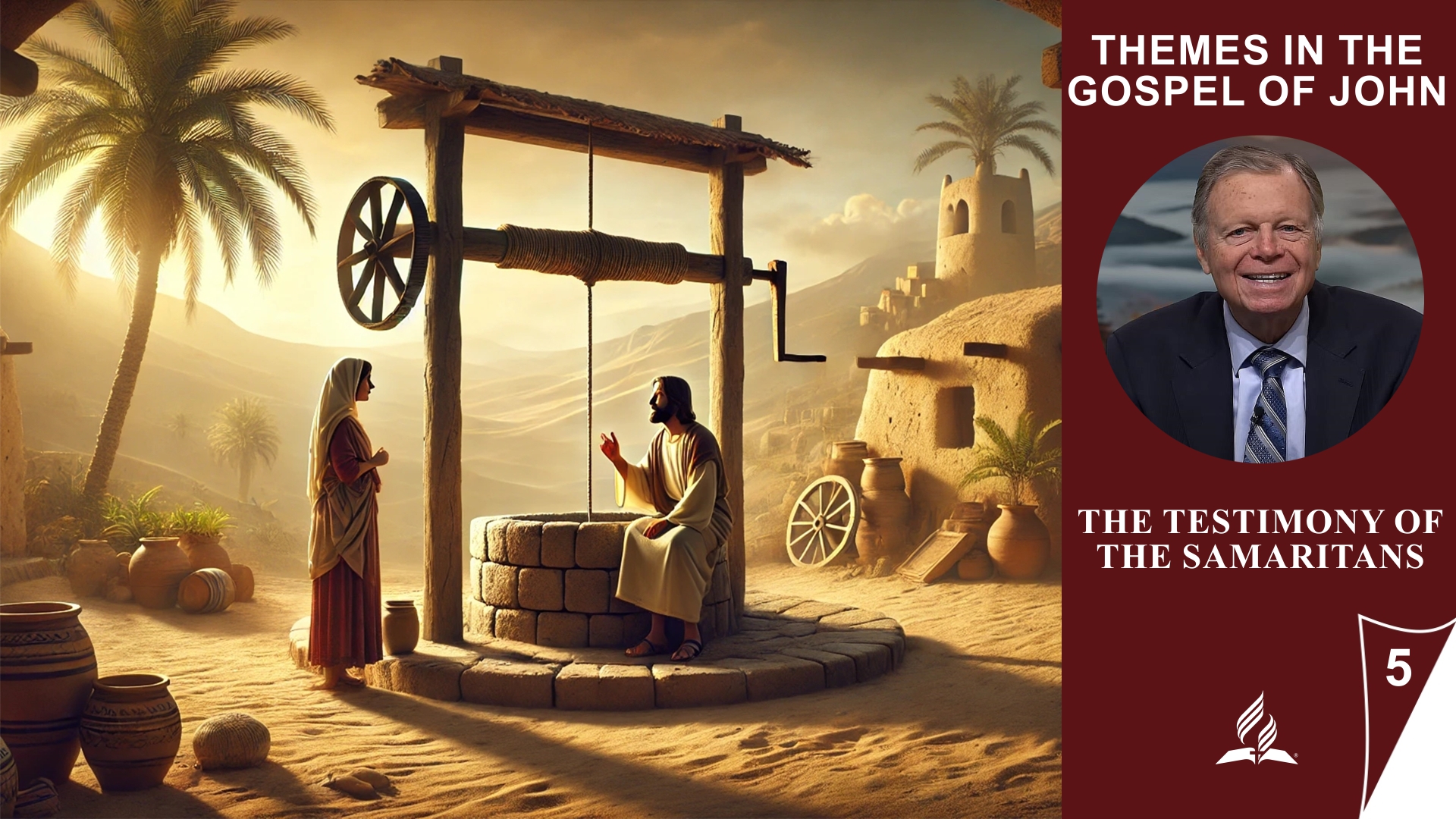
Series JESUS IN THE GOSPEL OF JOHN with Pastor Mark Finley |
Lesson 5.The Testimony of the Samaritans |
A simple testimony that moves hearts and overcomes barriers |
In John 4, Jesus encounters a Samaritan woman at Jacob’s well, and through a simple conversation, He reveals profound spiritual truths to her. Despite cultural and social barriers, the woman recognizes that she is in the presence of the Messiah. Excited by this revelation, she leaves her water jar behind and hurries into the town to tell others about Jesus. Her testimony leads many Samaritans to believe in Christ. This encounter demonstrates how powerful a simple personal testimony can be in spreading the Gospel and overcoming barriers.
Memory Text: John 4:42 – “Then they said to the woman, ‘Now we believe, not because of what you said, for we ourselves have heard Him and we know that this is indeed the Christ, the Savior of the world’.”
Content:
5.1 The Setting of the Encounter
The Road through Samaria: Jesus’ Mission Beyond Cultural Barriers
Jesus traveled through Samaria not only to avoid tensions with the Pharisees but because He had a deeper mission there. While other Jews avoided this path, Jesus deliberately sought out encounters with the Samaritans, who were considered outcasts. At Jacob’s well, He took the opportunity to start a conversation with a woman who was drawing water around noon, which was unusual. His simple request for water opened the door to a deep spiritual conversation that changed the woman. This encounter shows how Jesus broke through social and cultural barriers to proclaim the message of salvation. His example encourages us to dismantle prejudices and boldly bear witness, even in challenging situations.
5.2 The Woman at the Well
Living Water: Jesus’ Invitation to Inner Renewal
Jesus used the encounter with the woman at the well to subtly convey a deeper spiritual truth. Instead of immediately offering her a gift, He first asked her for a favor, thereby building trust and overcoming a barrier. By referring to the “living water,” He shifted the conversation from an everyday topic to a spiritual reality—the need for renewal through God. The woman, surprised by His request, began to understand that Jesus was more than just an ordinary man. Like Nicodemus, who needed a conversion experience, Jesus also showed this woman that true life is only possible through a deep connection with God. The “living water” symbolizes the eternal life that Jesus gives to anyone who believes in Him.
5.3 “Sir, Give Me This Water”
Living Water: From Physical Need to Spiritual Healing
The woman’s request for the living water shows her misunderstanding, as she initially took Jesus’ offer literally. Similar to Nicodemus, who misunderstood rebirth, she saw only practical relief, not the deeper spiritual meaning. Jesus skillfully steered the conversation to her personal situation to show her that she needed inner renewal and healing before she could receive the “living water”—a symbol for eternal life. As described in Ezekiel 36:25-27, her heart first needed to be cleansed and renewed to walk in God’s ways. This illustrates the necessity of being aware of one’s own faults to experience true healing and transformation.
5.4 The Revelation of Jesus
The Revelation of the Messiah: An Encounter Beyond Prejudices
Jesus reveals to the Samaritan woman that He knows her deepest secrets by disclosing her life and personal situation. Instead of dealing with these painful truths, she evades and redirects the conversation to religious disputes. However, Jesus brings the discussion back to the essential point: true worship is not tied to a specific location but must be done in spirit and truth. Finally, He reveals to her that He is the Messiah, and not in front of a large crowd, but to a simple, marginalized woman. This encounter shows that Jesus knows no barriers regarding origin or moral status—the Gospel is accessible to all and overcomes all human boundaries.
5.5 The Testimony of the Samaritans
The Power of a Personal Testimony: One Woman Changes a City
Surprisingly, after her encounter with Jesus, the woman left her water jar behind and hurried into the town to tell the people what she had experienced. Her honest and simple invitation, “Come, see a man who told me everything I ever did,” sparked curiosity and led many Samaritans to come to Jesus. Her personal testimony served as a powerful catalyst that led many people to believe in Jesus. This story demonstrates how a single encounter with Christ can change the lives of many and that even a simple personal testimony can have far-reaching effects. It teaches us that the Gospel, when shared authentically, can overcome barriers and open hearts.
5.6 Summary
The Testimony of the Samaritans: How a Personal Testimony Spreads the Gospel
In John Chapter 4, Jesus meets a Samaritan woman at Jacob’s well and reveals to her that He is the Messiah. This encounter changes the woman’s life, and she subsequently rushes into the town to report about Jesus. Her testimony leads many Samaritans to believe in Him. Through her simple account and invitation to meet Jesus herself, the Gospel spreads throughout her town. This story illustrates how a personal encounter with Christ and an honest testimony can change the lives of many people. It emphasizes that the Gospel can overcome barriers and reach people of all backgrounds.
Themes in the Gospel of John – Lesson 4.Witnesses of Christ as the Messiah | Sabbath School with Pastor Mark Finley
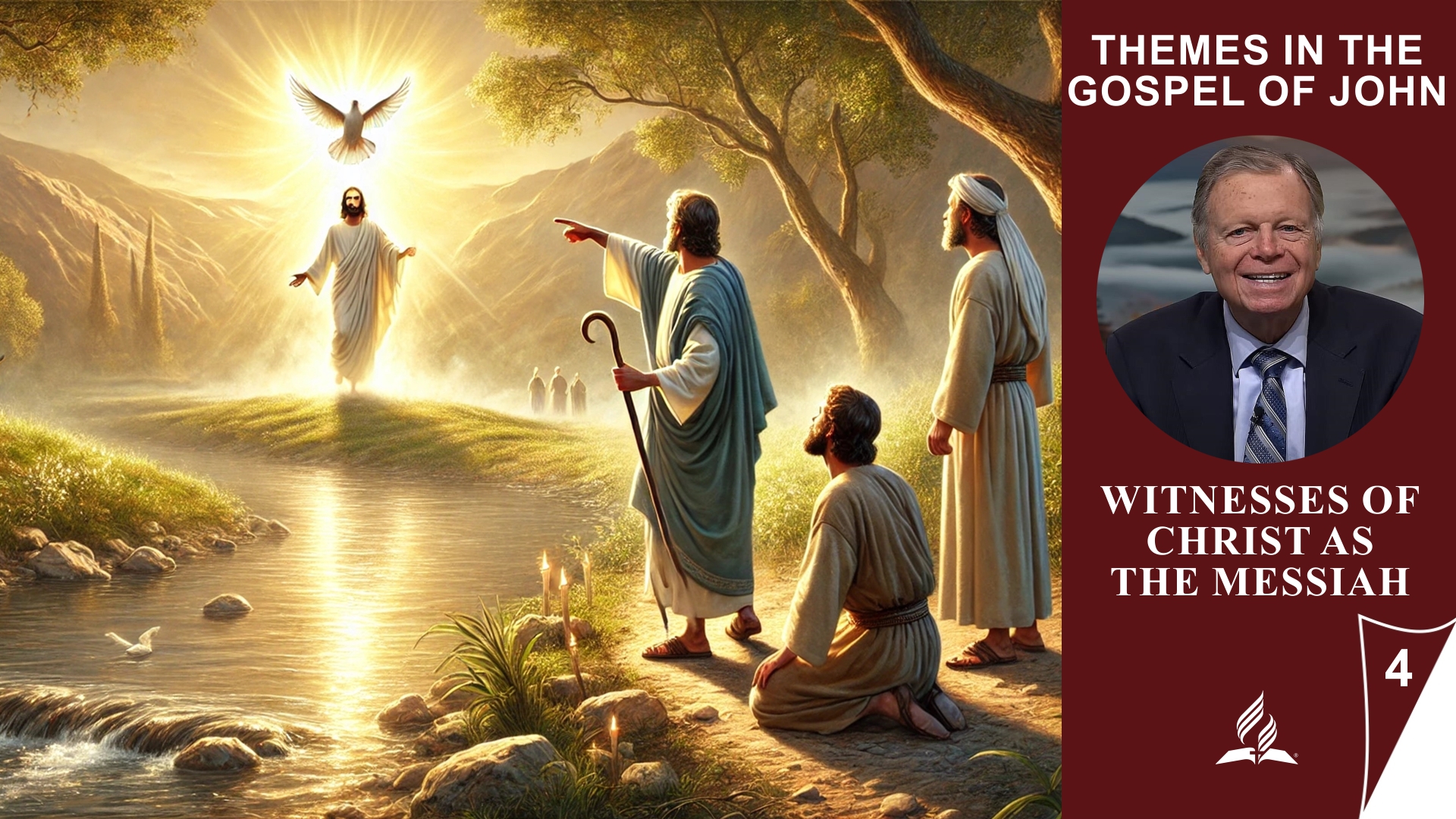
Series JESUS IN THE GOSPEL OF JOHN with Pastor Mark Finley |
Lesson 4.Witnesses of Christ as the Messiah |
Jesus Christ – The True Messiah |
Lesson 4 deals with the various testimonies that confirm Jesus Christ as the promised Messiah. The Gospel of John shows how different people—from John the Baptist to the first disciples—recognize Jesus as the Savior and point to Him. This lesson emphasizes that Jesus did not meet the expectations of a political or military savior but was the one who, through His sacrifice, was to renew the relationship between God and humanity. The testimonies we examine in this lesson reveal Jesus as the “Lamb of God” and fulfill the Old Testament promises about the Messiah. They invite us, just as the witnesses of that time did, to acknowledge Jesus as the true Savior.
Memory Text: John 3:3 – “Jesus answered and said to him, ‘Most assuredly, I say to you, unless one is born again, he cannot see the kingdom of God’.”
Content:
4.1 The Testimony of John the Baptist
John the Baptist: A Witness for the True Messiah
John the Baptist clearly understood his role as the forerunner of Jesus Christ. In John 1:19–23, he testifies that he is not the Messiah but merely one who points to the coming Savior. His mission was to prepare people for the Messiah’s arrival by directing their hearts toward repentance and spiritual renewal. John quoted Isaiah 40 to illustrate that he is the “voice crying out in the wilderness,” preparing the way of the Lord. As Seventh-day Adventists, we are similarly called to point to Christ and prepare people for His second coming through our service by proclaiming the message of repentance and salvation.
4.2 The Lamb of God
Jesus, the Lamb of God: The Messiah as a Sacrifice for the World
John the Baptist reveals Jesus as “the Lamb of God,” who takes away the world’s sin (John 1:29). This image of the lamb refers to the Old Testament sacrificial system, where lambs were offered as atonement sacrifices to atone for the people’s sins. Jesus fulfills this sacrificial promise by giving His own life to free humanity from sin. John’s proclamation corrects the misunderstood image of a military Messiah by presenting Jesus as the gentle and humble Savior who renews the relationship between God and humans through self-sacrifice. This conception of Jesus as the Lamb of God leads us to a deeper understanding of the high cost of redemption and God’s unconditional love.
4.3 The Two Disciples of John
The Disciples Recognize Jesus as the Messiah
When John the Baptist called Jesus “the Lamb of God,” two of his disciples decided to follow Him (John 1:35–39). They left John because they recognized that Jesus was the promised Messiah, greater than John. After spending time with Jesus, they felt deeply moved and inspired, prompting Andrew to immediately bring his brother Simon (Peter) to Jesus. This encounter changed their lives as they recognized the true Messiah. The Gospel of John illustrates the transformative power of encountering Christ and how it leads to spreading His message. Just as the disciples were changed, our faith in Christ calls us to also transform our lives and proclaim His message.
4.4 Philip and Nathanael
Nathanael: From Doubt to Faith
Philip demonstrates deep faith in Jesus when he tells Nathanael that they have found the one Moses and the prophets wrote about: Jesus of Nazareth (John 1:43–46). Despite Nathanael’s skepticism due to prejudices against Nazareth, Philip simply invites him to “come and see.” This invitation shows that true conviction often comes through personal encounter and experience. When Nathanael meets Jesus, he recognizes through Jesus’ knowledge of his life and prayers that Jesus is the promised Messiah. Nathanael makes a profound confession of faith by acknowledging Jesus as Rabbi, Son of God, and King of Israel. This encounter shows how Jesus, through divine insight, can bring revelation and faith even to the most skeptical hearts.
4.5 The Witness of Nicodemus
Nicodemus and the Necessity of Spiritual Rebirth
Nicodemus, a respected teacher and member of the Sanhedrin, sought out Jesus at night to learn more about His divine mission (John 3:1–21). Although he recognized Jesus as a Rabbi and saw His signs as evidence of divine calling, he did not yet understand that Jesus was the Messiah. Jesus sees through his heart and confronts him with an unexpected truth: he must be born again to see the Kingdom of God. This statement shows that even a righteous Jew needs profound spiritual renewal. Nicodemus, a teacher of Israel, had not yet grasped this fundamental truth. However, he later becomes a follower of Jesus, demonstrating how transformative encounters with Christ can awaken the heart. The rebirth that Jesus refers to emphasizes the necessity of complete inner renewal by the Spirit, regardless of one’s background or status.
4.6 Summary
The Diverse Testimonies About Jesus as the Messiah
The Gospel of John presents various testimonies pointing to Jesus as the Messiah. John the Baptist clearly explains that he is not the Christ but acts as a witness for the true Messiah. He calls Jesus the “Lamb of God,” referencing the Old Testament sacrificial system and underscoring Jesus’ role as the Savior. John’s disciples, such as Andrew and Philip, also recognize Jesus as the Messiah and follow Him after hearing his testimony. Nathanael overcomes his prejudices and confesses Jesus as the Son of God, while Nicodemus, a respected teacher, is taught by Jesus that spiritual rebirth is necessary to see the Kingdom of God. These testimonies emphasize Jesus’ role as the fulfillment of prophecy and as the Savior of humanity.
- « Previous Page
- 1
- …
- 8
- 9
- 10
- 11
- 12
- …
- 385
- Next Page »
